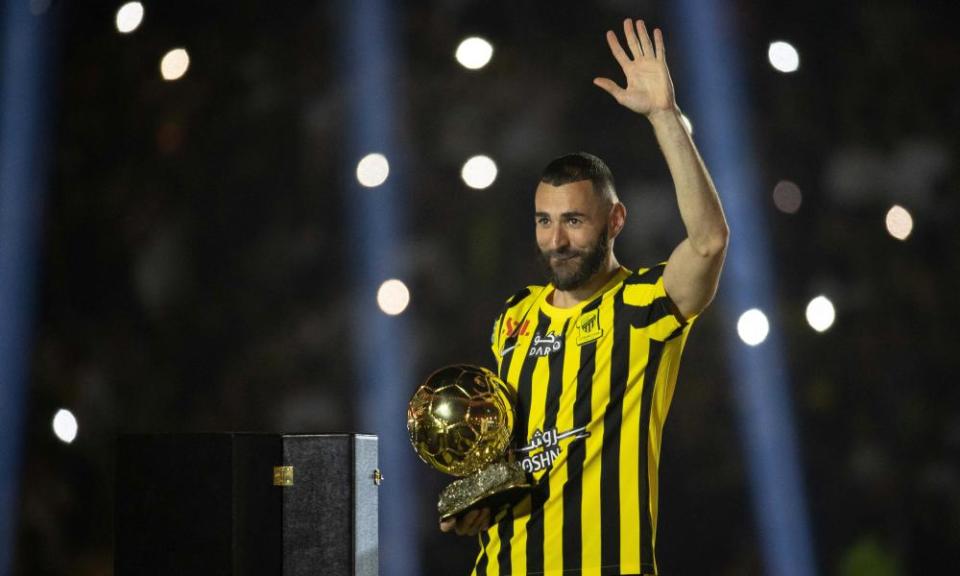Saudi golf takeover is blueprint for what they want to do everywhere else
Perhaps you were invited to the exclusive Venice wedding of a billionaire’s daughter where Jay Monahan and Yasir al-Rumayyan are reported to have met for the first time. Perhaps you happened to be playing a round at Beaverbrook Golf Course at the same time as Rumayyan and the PGA board member Jimmy Dunne were thrashing out the early stages of a deal that would change golf for ever. Perhaps you happened to be eavesdropping at the next table as they ate dinner or at least close enough to hurl a well-aimed bread roll or slip something into the ceviche.
Short of that, however, there is very little you or I could have done to prevent the effective merger of the PGA Tour with the rebel LIV Golf organisation, backed by the Public Investment Fund of Saudi Arabia. Your opinion was not consulted. Your vote was not canvassed. Players who had turned down eye-moistening sums of Saudi money out of what they laughably believed was a reciprocated loyalty to the PGA Tour found out, like everyone else, when their phones started pinging.
Let’s be reasonably firm about this at the outset. It doesn’t matter if you don’t like golf. You don’t have to harbour a shred of affection for the PGA Tour, which was essentially birthed in similar circumstances: an audacious power grab by the game’s top players in the 1960s. The finer details of how the new shared enterprise will work and what becomes of the beloved Milton Sewage Solutions Open at Grundle Pines should not overly detain us.
Related: Why Saudi Arabia can afford to play a long game in bid to control sport
The wider significance here is in the concussive speed and devastating lack of transparency with which this transaction was conducted, the way intractable obstacles were simply bulldozed or bought away, the utter indifference to public opinion, outcry, backlash. This may be the story of how Saudi Arabia bought golf. But really, it is a blueprint for what they want to do with everything else.
There remain a couple of curiously prevalent misconceptions when it comes to Saudi Arabia’s investment in golf. The first is that it is all simply part of an elaborate public relations exercise, a sanitisation of its image, an attempt to deflect attention away from its human rights abuses, its treatment of women and LGBT people, its brutal justice system, its role in a ruinous war in Yemen. But the extreme secrecy of the LIV-PGA Tour deal exposes the fact it knows exactly what people think of it.
The circle of trust, according to a report in the New York Times, was deliberately kept as small as possible. Even most of the PGA Tour board had no idea what was happening. Does this strike you as the behaviour of a regime concerned with winning hearts and minds? The brazenness, the wall of silence, the smoke and mirrors, the decision to present this deal to the world as a fait accompli: this is all part of the performance. The projection of power matters as much as the power itself. It says to the world: we bone-sawed a journalist, we bought golf and you didn’t even know anything was happening.

The second misconception is that the PGA’s surrender is no more than a venal money-grab, when it is clearly so many other things as well. Monahan may not be the most trusted guy in the room right now, but when he tells people the PGA Tour “cannot compete with a foreign government with unlimited money”, he’s simply stating a bald truth. The litigation and inflated purses required to compete with LIV Golf were threatening to emaciate the organisation piece by piece. Monahan knew this. So did the Saudis.
Reckon your favourite sport would put up any more of a fight? Football is already being bent towards the gravity of Saudi money, with the takeover of Newcastle United, the purchase of major stars such as Cristiano Ronaldo, Karim Benzema and N’Golo Kanté and a 2030 World Cup bid in the offing. The International Cricket Council has signed a major partnership with Aramco and there are persistent rumours of a lucrative Saudi Twenty20 league in the near future. Tennis is, quite frankly, a sitting target. Formula One, boxing: too late, lads. The NBA recently changed its rules to allow sovereign wealth funds to buy into its franchises, although the commissioner, Adam Silver, recognises Saudi investment is “a two-edged sword”. Which is nice.
The more tectonic shift, however, is less about individual sports and about the very idea of what sport is. Since its earliest days, organised sport has been conceived as its own end. The Olympic gold medal, the World Cup final, the Ashes urn, the season ticket at your local club: these things have an intrinsic worth, not as an auxiliary to a greater goal. But when entire clubs, entire competitions, even entire sports are being repackaged as investment vehicles, advertising boards, weapons of geopolitical power, then it is fair to wonder whether a turning point has been reached.
The tragic paradox is that for the most part the people who care about sport do not own it and the people who own it do not seem to care for it at all. It is of no consequence to Saudi Arabia whether or not you like golf. Eventually, it will find the thing you do like and your views will not be of interest to them. No, they will not be taking questions. No, you will not be kept up to date on progress. As ever, you will find out what’s happening whenever it decides you need to know.

 Yahoo Sport
Yahoo Sport 






































